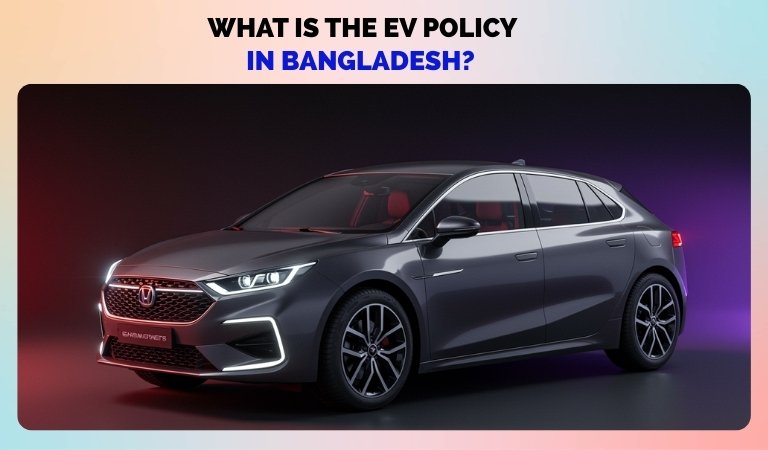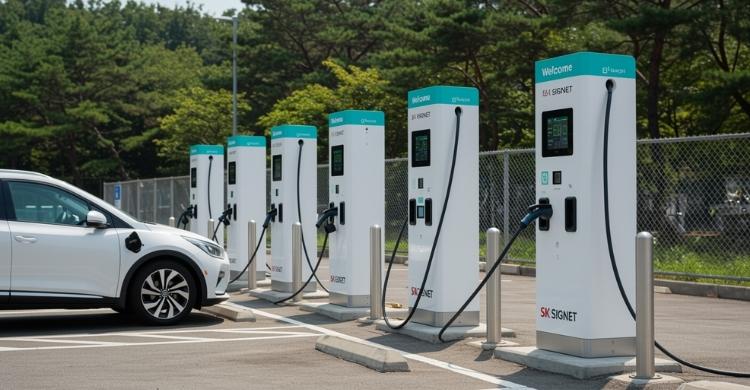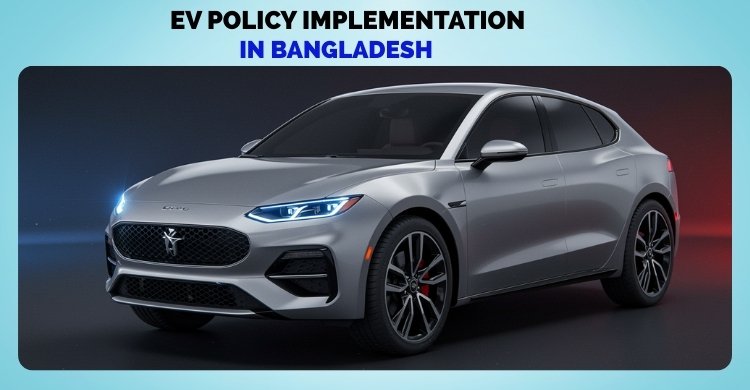Vehicles powered by electric motors (EVs) are transforming the way we think about transportation – providing an environmental-friendly, more sustainable alternative to conventional gasoline and diesel vehicles. In Bangladesh, the government has implemented a comprehensive strategy to encourage the shift toward electric mobility. Because of this, a common question arises: What is the EV policy in Bangladesh?
The EV policy in Bangladesh is aimed at electrifying 30% of vehicles by 2030, offering tax incentives, developing charging infrastructure, and reducing import duties on EV components. It promotes local manufacturing and encourages private sector investment to boost electric mobility and sustainability efforts.
Interested in learning more about the details and impact of these efforts? Keep reading and learn more about Bangladesh’s EV policy.
What Is the EV Policy in Bangladesh? (Key Insights)
The use of electric vehicles (EVs) is increasing, mainly due to their ability to reduce pollution. Bangladesh has created a policy to encourage the use of EVs in the country. This policy aims to make transportation more sustainable and cleaner. Let’s explore what the EV policy in Bangladesh is all about and how it plans to transform the country.

Goal of 30% EVs by 2030
The government wants 30% of all vehicles in Bangladesh to be electric by the year 2030. This means many cars, buses, and bikes will run on electricity instead of fuel. The plan is to make the air cleaner and reduce pollution. It is a big goal, but it can help the country in many ways. This change will also save money on fuel in the long run.
Tax Incentives for EV Buyers
To help people buy EVs, the government is giving tax cuts. This means you pay less money when you buy an electric vehicle. With lower taxes, EVs become cheaper and easier for people to buy. The goal is to make more people interested in using electric cars and bikes. It also helps more families afford this new type of vehicle.
Reducing Import Duties
Import duties are extra charges when bringing parts from other countries. The government is lowering these charges for EV parts. This makes it cheaper to bring EV parts into Bangladesh. It also helps local companies build electric vehicles at a lower cost. As a result, people may get EVs at better prices.
Building Charging Stations
Electric vehicles need charging stations to fill up with power. The government plans to build more of these stations across the country. This will help people charge their EVs more easily, even during long trips. With options like the Crack Platoon EV charging solution, people will feel safer using EVs, knowing they can charge them at various locations. This will also help EVs become more common.
Encouraging Local Manufacturing
The government wants local factories to build electric vehicles in Bangladesh. This can create more jobs for people and grow local businesses. If EVs are made here, they will be cheaper than imported ones. Making EVs in the country also helps Bangladesh become stronger in this new technology. It’s a good way to support the local economy.
Private Sector Investment
The Bangladesh government is encouraging private businesses to invest in electric vehicles and the technology behind them. By bringing in more investment, there will be more innovation and better quality EVs available for consumers. The private sector is expected to play a big role in making the EV policy successful.
Environmental Impact
Switching to electric vehicles can have a big positive impact on the environment. EVs produce less pollution and use renewable energy, which helps reduce carbon emissions. By promoting electric vehicles, the government is taking a step toward cleaner air and a healthier environment. This change will benefit not only the people of Bangladesh but the planet as well.
What Sectors in Bangladesh Will Benefit From the EV Policy?
Many countries are moving into electric vehicles, and Bangladesh is no exception. The government has made a new policy to promote the use of electric vehicles. This change will not only help the environment but also create new chances in many areas. Here are some sectors in Bangladesh that will benefit from this new electric vehicle policy:
Transport and Vehicles
The transport sector is one of the biggest areas that will benefit from the EV policy. Buses, cars, and motorcycles that run on electricity will help reduce fuel use and pollution. People will be able to save money on fuel and enjoy smoother rides. Companies that provide public transport may also switch to EVs to cut costs and help the environment.
Energy and Power
To support electric vehicles, the country will need more electricity. This means the energy sector will grow as more power stations and charging stations are built. There will also be a bigger focus on using clean energy, like solar and wind. This will help reduce pollution and make the energy system stronger.
Manufacturing and Industry
With the new policy, companies may start building electric vehicles and parts inside the country. This means more factories, more workers, and more jobs for people. Local businesses will get the chance to grow and compete in the EV market. It will also reduce the need to import vehicles from other countries.
Technology and Services
Electric vehicles need smart systems and apps to run well. This will create jobs for people who work in technology and services. For example, there will be new apps for finding charging stations or checking your battery level. As more people use EVs, the demand for tech-based services will also grow.
Business and Investment
The EV policy will attract both local and foreign businesses to invest in Bangladesh. More showrooms, service centers, and charging spots will be built, helping the economy grow. New businesses will be able to offer services and products related to electric vehicles. This will create more jobs and help boost small and large businesses.
Environment and Health
As more people start using electric vehicles, the air will become cleaner. Less fuel use means less smoke and harmful gases in the air. This will lead to fewer health problems like breathing issues. Cleaner air and a healthier environment will be a big benefit for everyone in the country.
How Bangladeshi Entrepreneurs Can Enter the EV Ecosystem?
The use of electric vehicles is gaining traction, and Bangladesh is also taking steps to support it. Businesses can take part in this growing market by taking advantage of the new EV policy. It’s not just about making cars—there are many other ways to get involved. Let’s explore how Bangladeshi entrepreneurs can enter the EV ecosystem and build their future in it.

Starting EV Showrooms
One simple way to join the EV market is by opening a showroom for electric vehicles. Entrepreneurs can sell electric bikes, scooters, and cars to people who want to switch from fuel-powered ones. This kind of business will grow as more people learn about EVs. Showrooms can also offer test drives, deals, and after-sales support to attract more buyers.
Building Charging Stations
EVs need charging stations to stay on the road. Setting up charging points in busy areas like markets, offices, and highways can be a great business idea. One smart way to get into this growing market is to start an EV charging business in Bangladesh, where demand is rising every day. These stations can earn money by charging a small fee for each use. As more vehicles become electric, the need for charging stations will grow fast.
Repair and Maintenance
Electric vehicles need special care and tools for repair and servicing. Entrepreneurs can start garages or workshops that focus only on EVs. They can also train workers to understand EV systems and handle them safely. This kind of service will be in high demand as more people start using electric cars and bikes.
EV Parts and Accessories
Another smart option is to sell EV parts and accessories. This includes things like batteries, chargers, lights, and tires. Entrepreneurs can either import these parts or help make them locally. Having a good supply of quality parts will help EV owners keep their vehicles in good shape.
Making EVs Locally
Some entrepreneurs might want to go big and try building electric vehicles in Bangladesh. This can be done by working with engineers and companies who know how EVs are made. Making EVs locally will reduce costs and give people cheaper options. It will also help the country depend less on imported vehicles.
Tech and App Services
Electric vehicles use a lot of smart features, so tech services are also needed. Entrepreneurs can create apps to help users find charging stations, check battery levels, or book repairs. These apps can make life easier for EV owners. Offering helpful and easy-to-use tech services is a good way to grow in this field.
What Kind of EVs Are Covered Under the Policy?
Bangladesh’s EV policy is designed to promote different types of electric vehicles across the country. These vehicles help reduce pollution and promote cleaner energy. But what kind of EVs are actually covered under the policy? Check it out.
Electric Cars
Electric cars are one of the most popular types of EVs in the policy. These cars are used by people for daily travel, like going to work or school. They run on batteries instead of petrol or diesel, so they make less noise and cause less pollution. The policy gives tax benefits and support to make electric cars more affordable. More people are now thinking about buying electric cars instead of regular ones.
Electric Buses
The policy also includes electric buses, which are great for public transport. These buses can carry many people at once without polluting the air. They are quiet, smooth, and cheaper to run in the long term. Cities like Dhaka can benefit a lot from electric buses because they help reduce traffic pollution. The government is encouraging bus companies to switch to electric.
Electric Motorbikes
Electric motorbikes are small, fast, and perfect for city roads. Many people use bikes in Bangladesh for work and travel, and electric ones are now becoming popular. They cost less to run and are easier to charge at home. The EV policy supports these bikes by lowering taxes and helping local companies make them. Delivery workers and riders can save money by switching to electric bikes.
Electric Rickshaws
Electric rickshaws, also called easy bikes, are common in towns and villages. They are often used for short rides and are cheaper than other vehicles. The policy supports these rickshaws because they help reduce noise and air pollution. Many drivers have already switched to electric ones because they save fuel costs. More support under the policy will help make these rickshaws better and safer.
Electric Trucks and Vans
Electric trucks and vans are used to carry goods in cities and between towns. They are very useful for businesses that need to move products every day. These vehicles produce less smoke and noise, which makes them good for the environment. The policy supports these kinds of EVs to help companies save money on fuel. Using electric trucks can also help keep cities cleaner.
Two and Three-Wheelers
The policy also covers smaller electric vehicles like scooters and three-wheelers. These are popular in both cities and rural areas because they are cheap and easy to drive. They are perfect for quick trips or short-distance travel. With help from the policy, more people can afford to buy and use them. This makes daily travel easier and more eco-friendly.
Challenges to EV Policy Implementation in Bangladesh
Bangladesh has taken a big step by making a policy to support electric vehicles. This plan sounds great, but there are still some problems that need to be solved. These issues make it harder for the policy to work well. Let’s look at the main challenges and how they affect the progress of electric vehicles in the country.

Lack of Charging Stations
One big challenge is the lack of charging stations for electric vehicles. Many people are also unaware of the types of EV chargers in Bangladesh, which makes it hard to choose the right one. Without easy access, many hesitate to use EVs. In several areas, there’s nowhere to charge, so both government and private sectors must expand charging points across the country.
High Cost of EVs
Electric vehicles still cost more than regular fuel-based vehicles in Bangladesh. Even though EVs save money in the long run, the high price at the start makes people think twice. Many people cannot afford the upfront cost. To fix this, better loan options and bigger discounts could help more people switch to EVs.
Shortage of Skilled Workers
EVs need trained people for repair and maintenance. Right now, there are not enough mechanics who understand how electric vehicles work. This makes it hard for EV users to get their vehicles fixed. More training centers and workshops are needed to build a strong group of skilled workers.
Weak Power Supply
Electric vehicles depend on electricity, but some parts of Bangladesh still face power cuts. If the electricity supply is not stable, it can become hard to charge EVs regularly. A strong power system is important to support more electric vehicles on the roads. The government needs to improve the power supply, especially in rural areas.
Lack of Awareness
Many people still don’t know much about electric vehicles and how they work. They might be afraid to try something new or think that EVs are not reliable. More public campaigns and awareness programs can help people understand the benefits of EVs. Once people learn more, they may feel more confident to use them.
Limited Local Production
Most electric vehicles and their parts are still imported from other countries. This increases the price and makes it harder for the local market to grow. If more parts and vehicles are made in Bangladesh, costs can go down. Local production can also create more jobs and help the economy grow.
FAQs About What Is the EV Policy in Bangladesh?
Many people are curious about how the EV policy works and what it means for the future of transportation in Bangladesh. While the main points have been discussed, there are still lots of smaller but important questions people often ask. Below are some clear and easy-to-understand answers to help you get a better idea of how this policy affects everyday life and the country’s progress.
How Does the EV Policy Help Rural Areas in Bangladesh?
The EV policy supports rural areas by planning the expansion of charging stations beyond major cities. It also encourages the use of smaller, affordable electric vehicles like three-wheelers and scooters, which are commonly used in villages. This can improve local transport while reducing fuel use and pollution.
Will EV Owners Get Any Government Benefits Besides Tax Cuts?
Yes, along with tax cuts, EV owners may get priority for special parking spots, reduced registration fees, and easier access to road permits. These benefits are meant to make electric vehicles more attractive and reward people who choose eco-friendly transport options.
Can People Convert Their Old Fuel Cars into Electric Vehicles?
Currently, converting fuel cars into EVs is not fully supported under the policy, but discussions are ongoing. If proper rules and safety checks are introduced, this could become a part of the policy later, giving people a cheaper way to switch to electric.
How Will the EV Policy Affect Public Transport Costs?
If buses and other public vehicles switch to electric, the running cost will be much lower than diesel or petrol ones. This could help reduce fares for passengers over time, making travel more affordable and eco-friendly for daily commuters.
Is Battery Recycling Included in the EV Policy?
Battery recycling is an important part of electric vehicle use, and the government is working on setting up systems for safe disposal and reuse. Proper recycling reduces waste and prevents harm to the environment, which supports the policy’s goal of cleaner transport.
Are Charging Stations Safe to Use in All Weather Conditions?
Yes, public charging stations are being designed with safety features to handle different weather conditions like rain or heat. This helps protect both the vehicle and the user during charging, making EVs a safe option for all seasons in Bangladesh.
How Will the EV Policy Affect Auto Mechanics?
Auto mechanics will need to learn new skills to repair electric vehicles. The policy encourages training programs and workshops to help them. This change can create better job chances and allow mechanics to stay updated with the latest vehicle technology.
Conclusion
Electric vehicles are no longer just a dream for the future—they are becoming part of daily life in Bangladesh. With cleaner air, quieter roads, and the promise of lower costs, EVs can change how people move, work, and live. But to make this change real, strong support and smart planning are needed.
So, what is the EV policy in Bangladesh? It’s a detailed plan to make 30% of all vehicles electric by 2030. The policy includes tax cuts, reduced import duties, better charging networks, and support for local businesses. It’s all about helping people and companies switch to electric while protecting the environment.
The road ahead may have challenges, but the direction is clear. With teamwork and effort, Bangladesh can build a cleaner, greener future through electric mobility.
